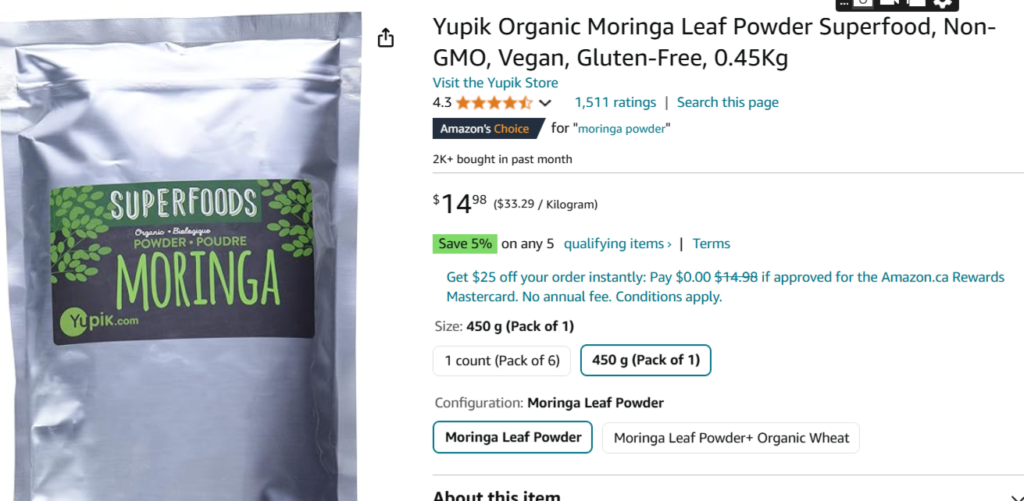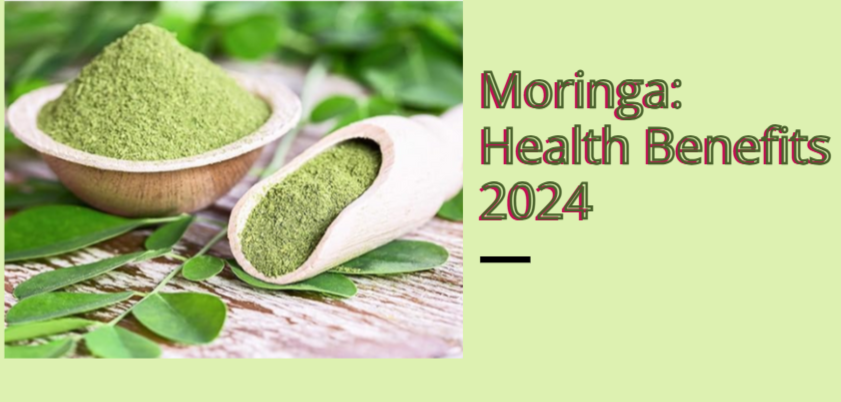Moringa oleifera, commonly known as the drumstick tree or horseradish tree, has been gaining popularity worldwide due to its impressive nutritional profile and numerous health benefits. Native to parts of Africa and Asia, moringa has been used for centuries in traditional medicine. This post delves into the incredible properties of moringa, its health benefits, how to incorporate it into your diet, and its environmental significance.
The Nutritional Powerhouse
Moringa is often hailed as a superfood, and for good reason. Its leaves, pods, seeds, and even roots are packed with essential nutrients. Here’s a breakdown of the key nutrients found in moringa:
- Vitamins: Moringa leaves are rich in vitamins A, C, and E, which are powerful antioxidants. Vitamin A supports vision and immune function, while vitamins C and E protect against oxidative stress.
- Minerals: Moringa is an excellent source of calcium, potassium, and iron. Calcium is vital for bone health, potassium helps regulate blood pressure, and iron is essential for preventing anemia.
- Proteins: Moringa leaves contain all nine essential amino acids, making it a complete protein source, which is rare for plant-based foods.
- Antioxidants: Moringa is packed with antioxidants like quercetin and chlorogenic acid, which help combat inflammation and chronic diseases.
- Phytochemicals: The plant contains numerous bioactive compounds, including flavonoids, which have various health-promoting properties.
Health Benefits of Moringa
The rich nutritional profile of moringa translates into a wide range of health benefits. Here are some of the most notable ones:
1. Anti-Inflammatory Properties
Chronic inflammation is linked to numerous health conditions, including heart disease and cancer. Moringa contains isothiocyanates, quercetin, and chlorogenic acid, which have been shown to reduce inflammation in the body.
2. Antioxidant Effects
The antioxidants in moringa help neutralize free radicals, which can cause oxidative stress and damage cells. This, in turn, can reduce the risk of chronic diseases such as diabetes, heart disease, and neurodegenerative disorders.
3. Blood Sugar Regulation
Moringa has been shown to help lower blood sugar levels. Compounds like isothiocyanates and chlorogenic acid improve insulin sensitivity and reduce glucose absorption in the intestines, making it beneficial for people with diabetes or at risk of developing the condition.
4. Heart Health
The antioxidants and anti-inflammatory compounds in moringa can improve heart health by reducing cholesterol levels and preventing the formation of arterial plaques. Potassium in moringa also helps regulate blood pressure.
5. Enhanced Immunity
Rich in vitamins and minerals, moringa boosts the immune system. Vitamin C, in particular, enhances the production of white blood cells, which are crucial for fighting infections.
6. Improved Digestion
Moringa’s high fiber content aids digestion by promoting regular bowel movements and preventing constipation. It also has antimicrobial properties that help maintain gut health.
7. Skin and Hair Care
The vitamins and antioxidants in moringa promote healthy skin by reducing the signs of aging and protecting against environmental damage. Moringa oil is often used in hair care products to nourish and strengthen hair.
https://amzn.to/3WwTxAj (Click on this link to buy Moringa Powder in best price rate)

https://amzn.to/4d7upp4 (Click on this to buy Moringa Oil)
https://amzn.to/4cR5C8U (Click on this link to buy best Moringa Capsules)
Incorporating Moringa into Your Diet
Moringa can be consumed in various forms, making it easy to incorporate into your daily diet. Here are some popular ways to enjoy this superfood:
1. Fresh Leaves
Moringa leaves can be used like spinach in salads, soups, and stews. They have a mild, slightly peppery flavor that complements many dishes.
2. Moringa Powder
Moringa powder is made from dried and ground leaves. It can be added to smoothies, juices, and teas or used as a seasoning for various dishes.
3. Moringa Capsules and Tablets
For those who find the taste of moringa too strong, supplements in the form of capsules or tablets are a convenient alternative. These provide all the nutritional benefits without the distinct flavor.
4. Moringa Tea
Moringa tea, made from dried leaves, is a refreshing and nutritious beverage. It can be enjoyed hot or cold and is often mixed with other herbs for added flavor.
5. Moringa Oil
Moringa oil, extracted from the seeds, is used in cooking and as a skin and hair treatment. It has a light, nutty flavor and is rich in healthy fats.
Growing Your Own Moringa
For those interested in cultivating their own moringa, it’s a relatively simple process. Here are some basic steps:
1. Choosing the Right Location
Moringa trees thrive in well-drained soil and sunny locations. They can tolerate poor soil but perform best in loamy or sandy soils.
2. Planting
Moringa can be grown from seeds or cuttings. Plant seeds directly in the ground or in containers, ensuring they are at least an inch deep. Water them regularly but avoid waterlogging.
3. Maintenance
Moringa trees grow rapidly and require minimal care. Prune them regularly to encourage bushier growth and prevent them from becoming too tall. Fertilize sparingly and water during dry periods.
4. Harvesting
Leaves can be harvested as soon as the tree is well-established. Regular harvesting promotes new growth. Pods, seeds, and roots can also be harvested for various uses.
Side Effects of Moringa
Moringa is celebrated for its numerous health benefits, but like any supplement or food, it can have side effects, especially when consumed in large quantities or by certain individuals. Here are some potential side effects to be aware of:
1. Gastrointestinal Issues
Some people may experience digestive discomfort when consuming moringa, especially in large amounts. Symptoms can include:
- Diarrhea: Moringa has a high fiber content, which can cause diarrhea if consumed excessively.
- Nausea: The strong taste and potent compounds in moringa can cause nausea, particularly when taken on an empty stomach.
- Bloating and Gas: The fiber and other compounds in moringa may lead to bloating and gas in some individuals.
2. Interference with Medications
Moringa can interact with certain medications, which may lead to adverse effects. If you are taking any of the following, consult your doctor before adding moringa to your diet:
- Blood Pressure Medications: Moringa has been shown to lower blood pressure, which can enhance the effects of blood pressure-lowering medications and potentially cause hypotension (abnormally low blood pressure).
- Diabetes Medications: Moringa’s ability to lower blood sugar levels may amplify the effects of diabetes medications, leading to hypoglycemia (abnormally low blood sugar levels).
- Thyroid Medications: Moringa may affect thyroid function and could interact with thyroid medications.
3. Potential Toxicity
While moringa leaves are generally safe, other parts of the plant can be toxic if consumed in large quantities:
- Roots and Bark: The roots and bark contain alkaloids that can be toxic and may cause nerve paralysis if ingested in significant amounts.
- Seeds: Moringa seeds contain a compound called spirochin, which can be toxic in large doses.
4. Allergic Reactions
Although rare, some individuals may be allergic to moringa. Symptoms of an allergic reaction can include:
- Rashes and Itching: Skin reactions like rashes and itching may occur in sensitive individuals.
- Swelling and Breathing Difficulties: Severe allergic reactions can cause swelling of the face, lips, and throat, leading to difficulty breathing, which requires immediate medical attention.
5. Effects on Pregnant and Breastfeeding Women
Moringa should be consumed with caution by pregnant and breastfeeding women:
- Pregnancy: Some studies suggest that consuming large amounts of moringa bark, root, or flowers may cause uterine contractions, potentially leading to miscarriage.
- Breastfeeding: While moringa leaves are generally considered safe and may even boost milk production, it is advisable to consult a healthcare provider before use.
6. Blood Clotting Issues
Moringa may affect blood clotting due to its high vitamin K content, which plays a role in blood coagulation. If you are taking blood thinners or have a bleeding disorder, consult your doctor before consuming moringa.
Moringa offers numerous health benefits, but it is essential to consume it responsibly and be aware of potential side effects. Always start with small amounts to see how your body reacts and consult a healthcare professional if you have any concerns or are taking other medications. As with any supplement, the key is moderation and informed use.
Conclusion
Moringa is a versatile and nutrient-rich superfood with a wide range of health benefits. Its ease of cultivation and environmental advantages make it an excellent addition to any diet and a sustainable crop for food security. Whether you’re consuming it fresh, as a powder, or in supplement form, incorporating moringa into your daily routine can enhance your overall well-being and contribute to a healthier planet.
Conditions of Use and Important Information
This information is intended to supplement, not replace, advice from your doctor or healthcare provider and may not encompass all possible uses, precautions, interactions, or adverse effects. It may not be applicable to your specific health circumstances. Never delay or disregard seeking professional medical advice from your doctor or another qualified healthcare provider. Always consult your doctor or healthcare professional before starting, stopping, or changing any prescribed part of your healthcare plan or treatment to determine the best course of therapy for you.


1 thought on “Discovering the Wonders of Moringa: A Nutrient-Packed Best Superfood 2024”